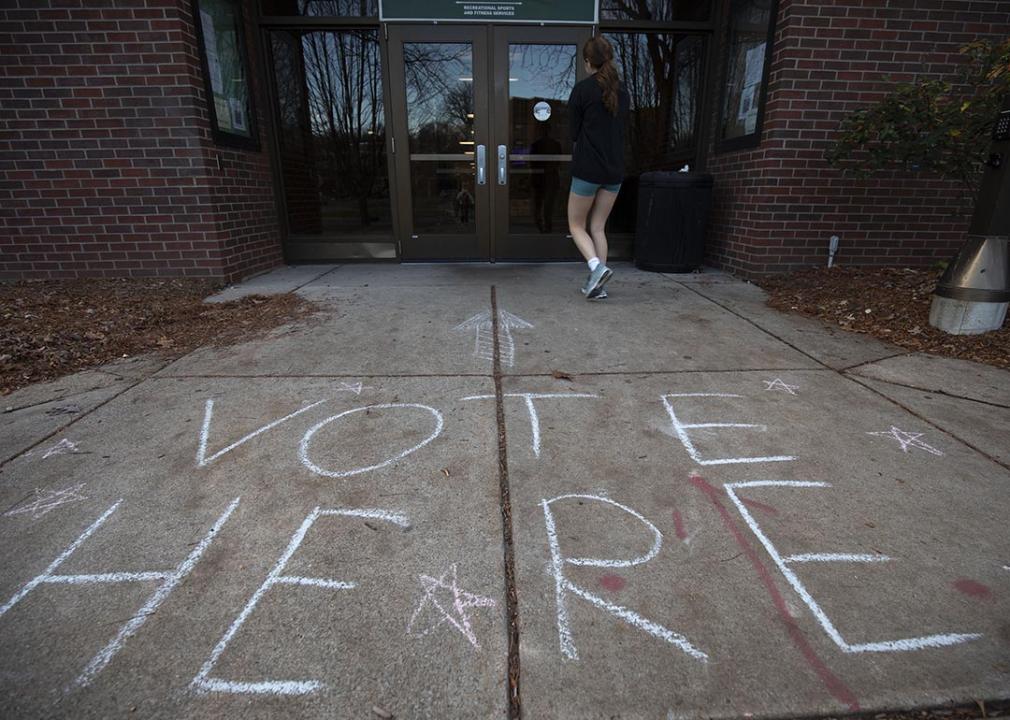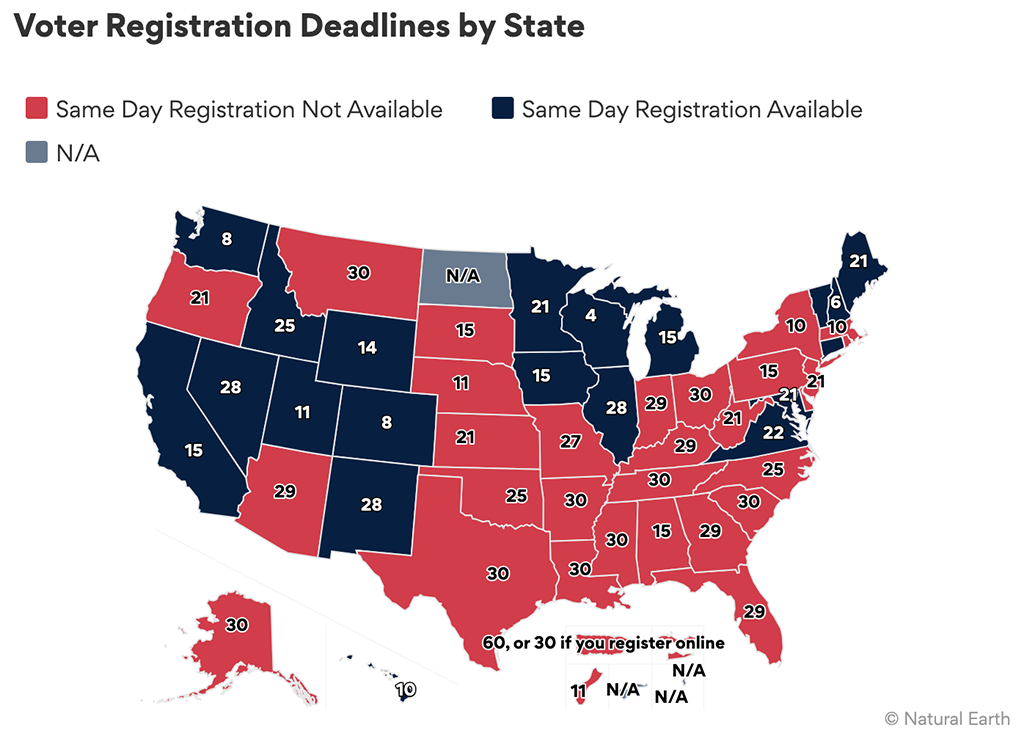What college students need to know before they vote

Bill Pugliano // Getty Images
What college students need to know before they vote
A person enters a polling location on the Michigan State University campus on Election Day.
The 2024 general election will be the first time many college students cast a ballot in any political race.
Elections confuse first-time and regular voters alike, especially with the myriad state-specific restrictions and rules. BestColleges’ Student Voting Guide aims to set you up with everything you’ll need to make your mark on this November’s election, which features the presidency and over 450 congressional seats up for grabs.
Dates and Deadlines to Know
Election Day is Tuesday, Nov. 5 this year.
If nothing else, this should be your primary takeaway from this voting guide. Debra Cleaver, founder and CEO of the nonprofit VoteAmerica, told BestColleges that the biggest predictor of someone’s likelihood to vote is whether they know the election date.
It’s not enough, however, to know when the election will happen.
For many traditionally aged college students, the 2024 general election will be the first election they participate in. If that rings true for you, you’ll likely need to register to vote beforehand.
Voter registration deadlines vary by location. State deadlines are no more than a month before the election, so if you register to vote by Oct. 1, you’ll be ready to cast your ballot on Election Day.
Twenty states and the District of Columbia allow same-day voter registration, meaning you can register when you go to cast your ballot. Find your state’s voter registration deadline:
![]()

BestColleges
Register to Vote
Image of a heatmap showing the voter registration deadlines by state.
You don’t need to wait for a fellow student to approach you with a clipboard to register to vote. U.S. citizens can register to vote online ahead of the 2024 general election, starting here:
https://www.voteamerica.com/register-to-vote/
Student Voting by the Numbers
Young voters (ages 18-29) have long been considered an afterthought among politicians. The cliché is that people under 30 don’t vote.
That’s not quite the case — at least not in recent elections.
The Center for Information and Research on Civil Learning and Engagement (CIRCLE) calculated a 50% voter turnout for people under 30 in the 2020 general election. That was up from 39% in the 2016 election.
The youth vote may have been the deciding factor in races in Arizona, Georgia, Michigan, and Pennsylvania — all key battleground states.
White youths voted at the highest rate in 2020 (61%), followed by Latino/a (48%), Asian (47%), and Black youth voters (43%).

BestColleges
Make Your Vote Count
Image of three squares each indicating voter stats by age, number of congressional seats up for grab in 2024, and Gen Zs who can vote in 2024.
CIRCLE’s Youth Electoral Significance Index predicts that the youth vote will have the largest impact on the presidential race in Wisconsin, Georgia, Arizona, Pennsylvania, and Michigan in the 2024 general election.
Another cliché is that younger voters are apathetic, but Cleaver believes those claims are overblown.
A 2020 survey of young people found that of those who didn’t vote, nearly one-quarter (22%) said they wanted to but couldn’t. Barriers prevent young people from voting at higher rates than other age groups, such as the inability to get time off work or school (17% for young voters vs. 9% for 35- to 64-year-olds).
Know Your Voting Rights as a College Student
College students are not immune to voter suppression tactics, Cleaver of VoteAmerica told BestColleges.
Because many college students are first-time voters, she said, they can be susceptible to voting mishaps. Here, we break down some common hurdles that trip college students up and explain how to clear those obstacles.
Where to Register to Vote
First-time voters will need to register to vote before they can cast a ballot.
Forty-two states, plus the District of Columbia and Guam, allow you to register to vote online. North Dakota doesn’t require voter registration at all, which means the only states where you’ll have to register in person or through the mail are:
Cleaver of VoteAmerica said many states require an in-state driver’s license to register online. That means if you’re an out-of-state student who wants to register where your school is, you’ll likely need to do so in person or through the mail.
She stressed that college students have dual residency, meaning they can vote in either their hometown or where their university is located.
“I think you should vote wherever you think your vote will have the most impact,” Cleaver said.
You can contact your dean of students if you need to register to vote through mail. The dean should be able to print any documents needed and mail your registration to the local election office.
Even if you’re already registered, you may need to re-register if your address changed since the last time you voted.
How to Preregister to Vote
If you are currently 17 years old but will turn 18 before Nov. 5, you can probably register now.
Most states will allow you to preregister at any point if you are at least 17 years old and will be 18 by Election Day. Some states, however, are stricter about how far in advance you can preregister. In Alaska, for example, you can only preregister once your birthday is within 90 days. In Texas, you must be 17 years and 10 months old to register.
The National Conference of State Legislatures will show your state’s age restrictions.
Can I Use My College ID to Vote?
In some states, you don’t need to show an ID to vote. Most states do require an ID, but a college ID may not suffice. Moreover, some states will only accept a college ID if the identification comes from a public college or university, Cleaver of VoteAmerica said.
Click here to find out if a college ID is suitable for voting in your state.
In states where a student ID won’t suffice, the nonprofit VoteRiders can help determine what form of ID your state will accept.
Voting Do’s and Don’ts
If the 2024 election will mark the first time you vote, here are some do’s and don’ts to remember when you head to the polls.
Voting Do’s
- Learn your state’s voter ID laws
Cleaver of VoteAmerica said voter ID laws tend to trip up college students at the eleventh hour. Many college students may attend school in a state that requires an ID to vote and not know it. Others know they need an ID, but they may bring an ID their polling place won’t accept, she said, and some states won’t even accept a passport as proper identification. Be sure to look up the ID requirements of the state you plan to vote in well before Election Day.
- Plan where you’ll vote ahead of time
Your county’s supervisor of elections office should tell you exactly where to vote based on your address, so look that up ahead of time. You’ll need to fill out a provisional ballot if you show up at the wrong polling station. If your polling station is far from campus and transportation is an issue, many local governments, nonprofits, and institutions offer transportation for voters.
- Ask for help if you need it
Poll workers know how to help address issues that can arise while voting — all you need to do is ask. Workers can also help people with disabilities fill out their ballots. At some polling stations, a poll worker can translate ballots for non-English speakers.
Voting Don’ts
- Don’t leave to vote unprepared
There will be more on your ballot than just the 2024 presidential candidates. State and local elections will likely appear on your ballot, too. Plus, many states and counties will include referendums for voters to approve or disapprove. You can access a sample ballot from your local supervisor of elections’ office ahead of time to plan your votes before you get into the booth. Alternatively, you can request a mail-in ballot so you can take your time in determining how you want to vote.
- Don’t be afraid to ask for a new ballot
Filling out your ballot for the first time may be nerve-wracking, and you wouldn’t be the first person whose nerves caused them to make a mistake. If that happens, don’t hesitate to ask a poll worker for help. They’ll provide a new ballot and set aside your previous ballot to be destroyed.
- Don’t let others impede your right to vote
Cleaver of VoteAmerica reminds students that once they are in line to vote, they are entitled to the ability to cast a ballot. It doesn’t matter if it’s past the polling station’s closing time. If you got in line before the cutoff, poll workers must still allow you to vote.
This story was produced by BestColleges and reviewed and distributed by Stacker Media.
